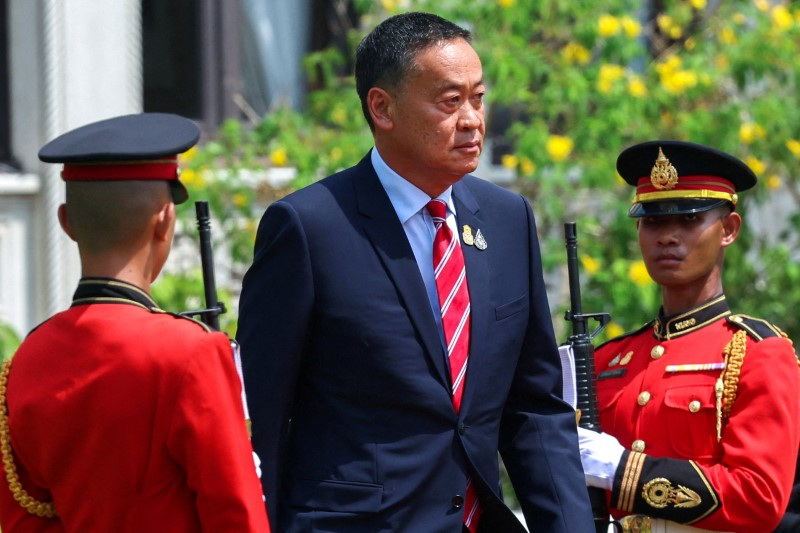Thai politics braces for shakeup after court dismisses PM Srettha Thavisin

By Panu Wongcha-um and Panarat Thepgumpanat
BANGKOK (Reuters) -Thailand’s Constitutional Court on Wednesday dismissed Prime Minister Srettha Thavisin and ruled he “grossly” violated ethics by appointing a minister who was once jailed, raising the spectre of political upheaval and a shakeup in the governing alliance.
Real estate tycoon Srettha is the fourth premier in 16 years to be removed in verdicts by the same court, underlining the central role Thailand’s judiciary has played in its long political crisis.
Srettha’s exit after less than a year in power means parliament must choose a new premier on Friday, with the prospect of more uncertainty in a country dogged by coups and court rulings that have brought down multiple governments and political parties.
His Pheu Thai Party, the biggest in the coalition, moved quickly to try to shore up its alliance and said it would meet early on Thursday to choose its candidate for prime minister ahead of a special session of parliament to vote on a new premier.
Pheu Thai and its predecessors have borne the brunt of Thailand’s turmoil, with two governments removed by coups in a long-running grudge match between the party’s founders, the billionaire Shinawatra family, and their influential rivals in the conservative establishment and royalist military.
The judges ruled 5-4 in favour of dismissing Srettha, saying he failed to perform his duty with integrity.
“The accused is terminated as prime minister due to his lack of honesty,” the judges said, adding his behaviour “grossly breached ethical standards”.
The decision was the court’s second bombshell in the space of a week following its dissolution of the opposition Move Forward Party – the 2023 election winner – over a campaign to amend a law against insulting the crown, which it said risked undermining the constitutional monarchy.
Move Forward has already regrouped as a new party, promising to further its anti-establishment agenda.
Both rulings came at a tricky time for an economy that Srettha struggled to jumpstart, with weak exports and consumer spending, sky-high household debt and more than a million businesses unable to access loans.
“It’s a negative surprise. It is a direct risk to the economy,” said Trinity Securities analyst Nuttachart Mekmasin, outlining key policies including Srettha’s 500 billion baht ($14.3 billion) cash handout plan may be stalled.
“Consumer and business confidence will be affected,” he said. “Spending and investment will slow down until the next government is formed.”
The government had estimated growth of just 2.7% for 2024, lagging regional peers, while Thailand stock market has been among Asia’s worst performers this year. It slipped 1.29% after the ruling before recovering to close 0.4% down.
UNCERTAIN TRUCE
Srettha expressed disappointment and said it was possible the next government could change his policy agenda.
“I am saddened to leave as a prime minister who was found to be unethical,” Srettha told reporters. “I performed my duties with integrity and honesty.”
The ruling could rock a fragile truce between political heavyweight Thaksin Shinawatra and his enemies among the conservative elite and military old guard, which enabled the tycoon’s return from 15 years of self-exile in 2023 and ally Srettha to become premier the same day.
Srettha’s undoing was his appointment to cabinet of Thaksin’s former lawyer Pichit Chuenban, who was briefly imprisoned for contempt of court in 2008 over an alleged attempt to bribe court staff, which was never proven.
The complaint was lodged by 40 former senators who were appointed by the military after a 2014 coup against Pheu Thai’s last government. Srettha’s deputy Phumtham Wechayachai takes over as caretaker premier.
The United States said it remained committed to its alliance with Thailand.
“The United States looks forward to the selection of a new prime minister as soon as possible, and a smooth transition of power,” a State Department spokesperson said.
According to some political experts, it is likely Pheu Thai has the clout to lead the next administration, though it was uncertain who would be in charge.
Anutin Charnvirakul, leader of the Bhumjaithai Party, the second-largest partner in the alliance, said the coalition remained tight and Pheu Thai should lead the formation of a new government.
“Pheu Thai is still leading the government … We have to listen to Pheu Thai,” said Anutin, who is now caretaker deputy premier.
A dealmaker who has long straddled both sides of Thailand’s political divide, Anutin is eligible for the top job as one of several politicians designated prime ministerial candidates by their parties before the last election.

Pheu Thai has two candidates it can nominate – former Justice Minister and party stalwart Chaikasem Nitisiri, and the party’s inexperienced leader Paetongtarn Shinawatra, Thaksin’s 37-year-old daughter.
Other potential candidates include acting Energy Minister Pirapan Salirathavibhaga and Prawit Wongsuwan, a staunch royalist and former army chief involved in two coups.





